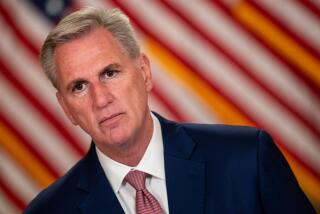Clinton Budget Surplus Put at $9.5 Billion
- Share via
WASHINGTON — President Clinton’s proposed federal budget for next year will include a $9.5-billion surplus, the first in three decades, Democratic aides familiar with the plan said Friday.
Through 2003, Clinton’s package, which will be unveiled Monday, envisions collecting a mammoth $218.7 billion more in revenue than the government will spend, the aides said, speaking on condition of anonymity.
That huge amount of black ink is a stark contrast to the hundreds of billions of dollars in red ink each year throughout the 1980s and the first half of the 1990s.
The $1.7-trillion federal budget for fiscal 1999 would eliminate deficits three years earlier than was planned under the budget-balancing pact the president and Congress reached last summer.
Republicans in Congress have said they also will produce a suggested budget with no deficit for next year. The two sides will spend the next few months trying to work out a compromise spending plan.
Last year’s deficit of $22 billion was the first below $100 billion since 1981. For fiscal 1998, which runs through Sept. 30, congressional analysts expect a $5-billion deficit, while the White House projects a $10-billion shortfall.
The president’s package predicts surpluses of $8.5 billion in 2000, $28.2 billion in 2001, $89.7 billion in 2002 and $82.8 billion in 2003, the sources said.
*
Documents obtained Friday also show a sharp increase in spending for new weapons in a proposed defense budget of $270.6 billion.
The defense blueprint seeks $48.7 billion for weapon purchases, including the first two Air Force F-22 fighters, 30 Navy FA-18 E and F fighters, a new attack submarine, an amphibious assault ship and three destroyers. That’s up nearly $4 billion from this year’s weapon spending. The total proposed defense budget itself for next year is $3 billion more than this year. In addition, the spending blueprint pledges to reach a level of $61 billion for weapons by 2001.
Defense Secretary William S. Cohen is to announce the spending package on Capitol Hill next week.
Another part of the budget plan, which Clinton outlined to mayors on Friday, is $400 million in funding to attract and keep commercial investment in depressed cities.
Also part of the urban agenda that Clinton will include in his budget proposal are $28 million to crack down on gun trafficking and $50 million to hire more prosecutors.
Clinton envisions collecting $65.5 billion over the next five years from a possible settlement with the tobacco industry to help pay for new spending. He would use the money to hire 100,000 teachers, boost scientific research and expand access to child care, the Democratic sources said.
It remains uncertain, however, that Clinton, Congress and the tobacco industry will agree this year on legislation arising from a tobacco settlement reached between cigarette companies and 40 states in 1997.
The president also plans to raise nearly $25 billion over the next five years by increasing mostly obscure taxes on some businesses and investors.
And he would save about $30 billion from some benefit programs by such proposals as reducing Medicare waste and fraud.
More to Read
Get the L.A. Times Politics newsletter
Deeply reported insights into legislation, politics and policy from Sacramento, Washington and beyond. In your inbox three times per week.
You may occasionally receive promotional content from the Los Angeles Times.










